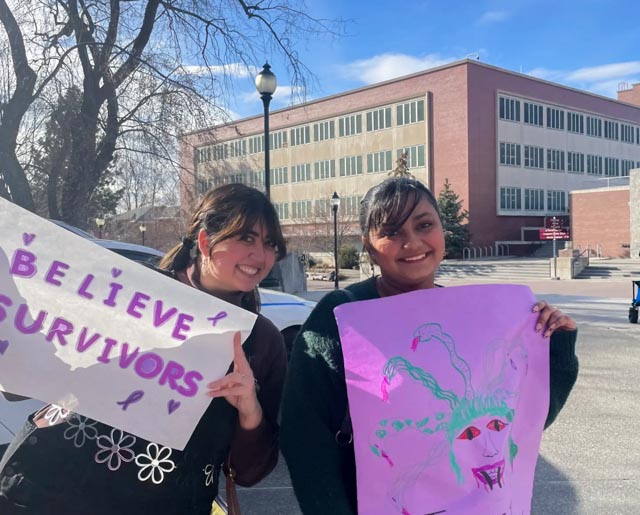The fight to support survivors of sexual assault on college campuses
Not recieving justice is a fear for survivors
Students hold up posters during a rally to support survivors of sexual assault and abuse, April 14, 2023.
April 24, 2023
Editor’s note: This article contains details about sexual assault that may be triggering for some readers.
One out of every four female undergraduate students survives sexual assault while in college.
According to a study from the Rape, Abuse & Incest National Network (RAINN), young women aged 18–24 are four times more likely than other women to be sexually assaulted.
Only 20% of female undergraduate students who survive sexual assault choose to report their assault to law enforcement.
Payton Freund, a violence prevention student coordinator at the WSU Women*s Center, said she has met many survivors who did not report out of fear of not receiving justice.
“So many people choose not to report the violence that they’ve experienced just because it’s rare for them to actually receive the justice that they deserve,” Freund said. “I think being trauma-informed and understanding exactly what survivors go through and experience might make a difference within the legal system.”
Freund said a possible way to help encourage survivors to report would be to require trauma-informed training for officials working with survivors.
“I really hope that it would increase the number of people, especially women, who are willing to report any violence that they have experienced due to no longer being afraid that they will receive backlash, especially from the professionals who are supposed to be helping them,” Freund said. “A lot of women may experience being victim-blamed by police officers.”
Holly Ashkannejhad, the director and Title IX coordinator of Compliance and Civil Rights at WSU, said she has seen a lack of respect and belief for survivors.
“There’s still this perception that a lot of people have that somebody was asking for it, or because they can’t quite remember everything that happened, it didn’t happen,” she said. “There’s an instinct to not want to believe that something really bad like that could happen or that somebody could be cruel to somebody.”
Survivors should have the right to choose whether to report the assault, she said.
“There’s a real need to help empower people to have their voices be heard,” she said. “They have a voice and a choice. They should have a say in what happens to them because they just had their say taken away.”
Even if survivors choose not to report their sexual assaults, it may be beneficial for them to record the information in a formal method, Ashkannejhad said.
“Even if you aren’t in a position where there’s enough evidence to drive a case forward, making those reports and having that information recorded somewhere is helpful in a bigger way,” she said.
Perpetrators of sexual violence often repeat their behavior, Ashkannejhad said. If a survivor records their information and reports the offender, it can help future survivors of the same perpetrator and will trigger a stronger response from the investigator.
It can be helpful for survivors to share their experiences, she said.
“I think it’s important to have less fear about talking about your experience because it really is a healing thing to communicate how you’re feeling,” Ashkannejhad said.
A march was held to support survivors of sexual assault earlier in April hosted by the Coalition for Women Students.









